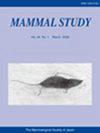Pre- and Postpartum Acoustic Activity in Captive Pacific White-Sided Dolphin (Lagenorhynchus obliquidens) Mothers
IF 0.8
4区 生物学
Q3 ZOOLOGY
引用次数: 0
Abstract
Active acoustic emission from a mother to a calf after parturition is one strategy used to enhance recognition of mothers by calves and develop, then maintain, a mother–calf bond from an early stage. This study predicted that a high-calling postpartum period exists in a social delphinid, the Pacific white-sided dolphin (Lagenorhynchus obliquidens). This species produces pulsed call sequences for vocal exchange with conspecifics, and these sequences appear to be an important signal between mothers and calves. Sounds were recorded from three pregnant females at the Niigata City Aquarium, Marinepia Nihonkai, Japan, before and after each birth in 2019, 2020, and 2021 to investigate the rate of their pulsed call sequences. Continuous data from prior to four days to five days following parturition, opportunistic data within the last pre-parturition month, and data from the postpartum period were obtained from the females. The pulsed call sequence gradually increased during the last gestational month. A high-rate sequence was repeated daily for four days pre-parturition and faded within several hours postpartum, and few sequences were produced from the day after parturition. Contrary to our prediction, the many pre-parturition sequences and fewer postpartum sequences suggest a low efficiency of postpartum imprinting in this species.圈养太平洋白边海豚(Lagenorhynchus obliquidens)母亲的产前和产后声学活动
母象在分娩后向幼象发出主动声发射是一种策略,用于增强幼象对母象的识别,并从早期阶段开始发展并维持母子关系。本研究预测社会性海豚——太平洋白边海豚(Lagenorhynchus obliquidens)存在高呼唤期。这个物种产生脉冲呼叫序列,与同种动物进行声音交换,这些序列似乎是母亲和幼崽之间的重要信号。研究人员在2019年、2020年和2021年分别记录了日本Marinepia Nihonkai新泻市水族馆的三只怀孕雌性海豚在每次分娩前后的声音,以调查它们脉冲叫声序列的频率。从女性中获得分娩前4天至分娩后5天的连续数据,分娩前最后一个月的机会性数据以及产后数据。脉冲叫声序列在妊娠最后一个月逐渐增加。高率序列在产前4天每天重复,产后数小时内消失,从分娩后一天开始产生的序列很少。与我们的预测相反,许多产前序列和较少的产后序列表明该物种的产后印记效率低。
本文章由计算机程序翻译,如有差异,请以英文原文为准。
求助全文
约1分钟内获得全文
求助全文
来源期刊

Mammal Study
ZOOLOGY-
CiteScore
1.70
自引率
20.00%
发文量
23
审稿时长
>12 weeks
期刊介绍:
Mammal Study is the official journal of the Mammal Society of Japan. It publishes original articles, short communications, and reviews on all aspects of mammalogy quarterly, written in English.
 求助内容:
求助内容: 应助结果提醒方式:
应助结果提醒方式:


